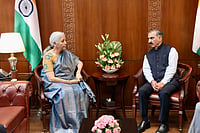The Ayushman Bharat Health and Wellness Centres (AB-HWCs) have recorded over 211 core footfalls till October 24 and people have availed free drugs over 1,83 crore times, Union Health Minister Mansukh Mandaviya said on Monday.
Addressing the 76th session of the World Health Organization Regional Committee for South-East Asia, Mandaviya lauded the progress of AB-HWCs, saying these have played an instrumental role in providing a comprehensive array of primary healthcare services.
"As of October 24, AB-HWCs have recorded over 2,110 million footfalls. The impact is resounding with individuals availing free drugs over 1,830 million times and diagnostic services over 873 million times," he said.
The minister added that "26 million wellness sessions have been conducted engaging more than 306 million people".
Dr Tedros Adhanom Ghebreyesus, the Director-General of WHO, attended the event virtually. Mandaviya was also unanimously elected as chairperson of the 76th session of the regional committee of South-East Asia.
Reiterating the vision of Prime Minister Narendra Modi, the Union health minister said, "In India, we are following a holistic and inclusive approach. We are expanding health infrastructure, promoting traditional systems of medicine and providing affordable healthcare to all in alignment with the vision of Universal Health Coverage with the resolute commitment of leaving no one behind."
Mandaviya noted that initiatives such as the Ayushman Bharat Digital Mission and PM-ABHIM (Ayushman Bharat Health Infrastructure Mission) have substantially strengthened the digital health framework and physical infrastructure, catalysing a revolutionary evolution of healthcare delivery in the nation.
"Our current focus on primary health centres through AB-HWC emulating a synergistic approach will result in immeasurably positive health outcomes and reduction in out-of-pocket expenditures and become a model for other countries engaged in health sector reforms," he highlighted.
Also addressed the gathering at a tree plantation ceremony at the WHO SEARO Building site, IP Estate, New Delhi, Mandaviya said, "The WHO SEARO building stands as a symbol of a collaborative effort of India and WHO to address the global challenges to ensure inclusive and equitable development of healthcare services in the South-East region."
He noted India's contribution of Rs 239.5 crore for the completion of this grand project which envisions a hub for collaboration, research and knowledge exchange among health professionals for addressing regional health challenges, sharing best practices and developing innovative solutions.
Union Health Secretary Sudhansh Pant highlighted that the establishment of the South-East Asia Regional Forum for primary health care (PHC)-oriented health systems marks a pivotal moment in the commitment to fostering knowledge sharing and collaborative support in addressing challenges hindering PHC strengthening.
Lauding the progress of member states in embracing PHC-oriented health systems, he said, "Focused attention is now required in key areas of enhancing capacities for progress tracking and accountability, institutionalizing participatory mechanisms in urban health care (UHC)/PHC governance, and fostering synergized support from WHO and partners tailored to national systems and contextual nuances."
Tedros noted that the 76th Session of SEARO comes at a crucial time point in time, both globally and for the region. He highlighted that the South-East Asia region is home to more than a quarter of the world's population and must address a significant burden of diseases.
-With PTI Input


























